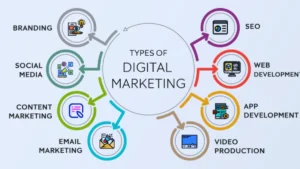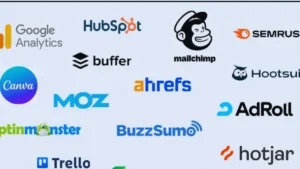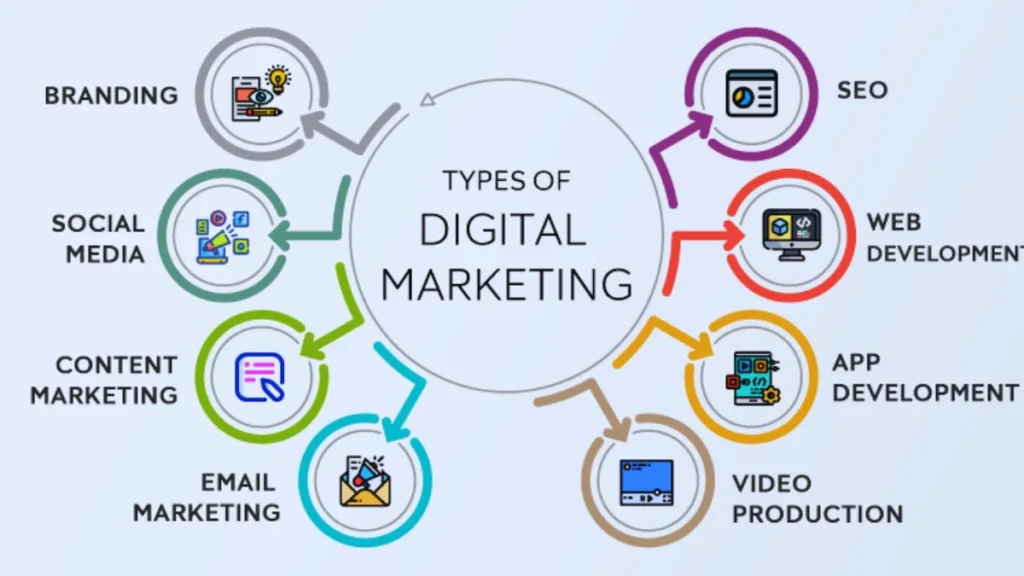Digital marketing is a critical part of any modern business strategy. With the rise of the internet and an increase in mobile devices, businesses must now leverage digital channels to engage with customers, build brand awareness, and drive conversions. In this article, we will explore the types of digital marketing, the advantages thereof, and how businesses can use them to succeed online.
Types of Digital Marketing

| Type of Digital Marketing | Description | Tools |
| SEO (Search Engine Optimization) | Optimizing your website to rank higher in search engines for organic traffic. |
Google Analytics, Yoast SEO, SEMrush
|
| Content Marketing | Creating valuable content to engage and inform your audience. |
BuzzSumo, Canva, HubSpot
|
| Social Media Marketing | Promoting your business through social media platforms. |
Hootsuite, Buffer, Sprout Social
|
| Email Marketing | Sending personalized emails to nurture leads and retain customers. |
Mailchimp, ConvertKit, Sendinblue
|
| PPC Advertising | Paying for ads that appear in search results or on websites. |
Google Ads, Facebook Ads Manager, SpyFu
|
| Affiliate Marketing | Partnering with affiliates to promote products in exchange for commissions. |
ShareASale, Amazon Associates, ClickBank
|
Search Engine Optimization (SEO)
SEO is the backbone of any successful digital marketing strategy. It involves optimizing your website to rank higher in search engine results pages (SERPs), which drives organic traffic. SEO focuses on both the technical aspects of your site and the content you produce.
- On-page SEO: optimizing individual web pages with targeted keywords, meta tags, header tags, and high-quality content.
- Off-page SEO: Building backlinks from reputable websites to increase your website’s authority.
- Technical SEO: Ensuring your website’s technical structure is search-engine friendly, including optimizing page speed, mobile responsiveness, and secure connections (HTTPS).
Read more: Influencer Marketing Boost Your Brand’s Success in 2024
Tools for SEO:
- Google Analytics: Track and analyze website traffic.
- Yoast SEO: Optimize on-page content for better search rankings.
- SEMrush: Keyword research and competitive analysis.
Benefits of SEO:
- Increased Visibility: Ranking higher in search engines leads to more organic traffic.
- Cost-effective: Unlike paid ads, SEO efforts lead to long-term results.
- Builds Trust: Websites ranking at the top of search results are often perceived as more trustworthy.
- Content Marketing
Content marketing is all about creating and distributing valuable content to attract, engage, and retain your audience. Whether it’s blog posts, videos, infographics, or social media content, it helps nurture relationships with potential customers.

- Content Strategy: A solid content marketing strategy involves understanding your audience’s needs and preferences, creating a content calendar, and consistently publishing high-quality content.
- Content Formats: blogs, videos, podcasts, ebooks, case studies, and social media posts.
Tools for Content Marketing

- BuzzSumo: Discover trending content ideas and analyze competitors.
- Canva: Create eye-catching graphics and visuals for your content.
- HubSpot: Automate your content marketing efforts and manage lead generation.
Benefits of Content Marketing:
- Improved SEO: Well-written, relevant content improves search rankings.
- Audience Engagement: Engaging content helps you build relationships and trust with your audience.
- Brand Authority: Consistent, informative content positions your business as an industry expert.
- Social Media Marketing
Social media marketing involves promoting your business through social platforms like Facebook, Instagram, Twitter, and LinkedIn. It’s a great way to connect with your target audience, share updates, and engage in conversations.
- Organic Social Media: Posting content regularly, engaging with followers, and building community.
- Paid Social Media: Running ads targeted to specific demographics or interests, such as Facebook Ads, Instagram Ads, and LinkedIn Ads.
Tools for Social Media Marketing
- Hootsuite: Schedule posts and manage multiple social media accounts.
- Buffer: Plan, create, and analyze your social media posts.
- Sprout Social: social media management and analytics tools.
Benefits of Social Media Marketing:
- Brand Awareness: Reach a large audience quickly with organic and paid strategies.
- Customer Engagement: Directly engage with followers through comments, likes, shares, and direct messages.
- Targeted Advertising: Social media platforms offer advanced targeting options, ensuring your ads reach the right people.
- Email Marketing
Email marketing remains one of the most effective forms of communication for businesses. By sending personalized, targeted emails, you can nurture leads, retain customers, and encourage repeat business.
- Email Types: Newsletters, promotional offers, product updates, and transactional emails.
- Segmentation: Segment your email list based on demographics, interests, or behaviors to send relevant content to each group.
Tools for Email Marketing
- Mailchimp: Manage your email campaigns and automate email sequences.
- ConvertKit: Simplified email marketing and automation for creators and small businesses.
- SendinBlue: Email marketing with advanced features like SMS and automation.
Benefits of Email Marketing:
- High ROI: Email marketing offers one of the highest returns on investment among digital marketing channels.
- Personalization: Tailor your message to specific audiences based on their behavior.
- Customer Retention: Keep your audience engaged with regular updates and special offers.
- Pay-Per-Click (PPC) Advertising
PPC advertising involves paying for ads that appear in search results or on websites. Each time someone clicks on your ad, you pay a fee. It’s an effective way to quickly drive traffic to your site.
- Google Ads: The most widely used PPC platform, where you can bid on keywords to have your ads appear on search results.
- Social Media Ads: Run targeted ads on platforms like Facebook, Instagram, and LinkedIn to reach specific audience segments.
Tools for PPC Advertising
- Google Ads is the leading platform for search engine advertising.
- Facebook Ads Manager: Manage and create ad campaigns on Facebook and Instagram.
- SpyFu analyzes competitor ad strategies and keywords.
Benefits of PPC Advertising:
- Immediate Results: Unlike SEO, PPC campaigns can bring instant traffic.
- Highly targeted: Advertisers can target specific keywords, demographics, locations, and interests.
- Scalable: PPC campaigns can be scaled up or down based on your budget and performance.
- Affiliate Marketing
Affiliate marketing is a performance-based marketing strategy where businesses reward affiliates (partners) for driving traffic or sales through their marketing efforts.
- How It Works: Affiliates promote your products using special links. They earn a commission on any sales or leads they generate.
Tools for Affiliate Marketing
- ShareASale is an affiliate network that connects merchants and affiliates.
- Amazon Associates is Amazon’s affiliate program to promote their products and earn commissions.
- ClickBank is a global marketplace for affiliate marketers.
Benefits of Affiliate Marketing:
- Low Risk: You only pay for actual sales or leads.
- Wider Reach: Access a network of affiliates who promote your products to a broader audience.
- Cost-effective: Since it’s performance-based, you pay for results rather than upfront costs.
Digital marketing encompasses a wide variety of strategies that businesses can use to connect with their target audience and achieve success online. From SEO to content marketing, social media marketing, and PPC advertising, each channel plays a crucial role in a comprehensive online strategy. By integrating the right tools and techniques, businesses can enhance their digital presence, drive conversions, and ultimately achieve their marketing goals.
Remember, consistency and optimization are key to any digital marketing strategy. Experiment with different approaches, track your results with the tools mentioned, and refine your tactics to stay ahead in the competitive digital space.
For further reading on each type of digital marketing, check out these resources:
- Google Analytics for tracking and analyzing performance.
- SEMrush for SEO and competitive analysis.
- Canva for creating engaging content visuals.
FAQs
1. What and what are types of digital marketing?
Digital marketing consists of Search Engine Optimization, Content Marketing, Social Media Marketing, Email Marketing, Pay-Per-Click Advertising, and Affiliate Marketing. There are different specific strategies for each type, and each gives its own advantage for business growth.
2. Which one of the digital marketing strategies is the best?
The effectiveness of a digital marketing strategy is going to depend on your goals, your audience, and your industry. In general, SEO and content marketing are sometimes referred to as long-term, lower-cost strategies, while PPC campaigns tend to achieve faster results.
3. What is the impact of SEO on digital marketing?
SEO means Search Engine Optimization and it determines the visibility of your website by improving its ranking within a search engine for organic search. SEO relates to optimizing content, site structure, and backlinking for better visibility and engagement.
4. Why is social media marketing important?
Social media marketing allows companies to reach more people, increase brand awareness, and engage directly with customers. It serves as a base for building relationships and promoting confidence with potential clients.
5. What is a PPC advertisement and how does it work?
Pay-per-click is an advertising model where ads show up on search engine or website pages, and the company only pays when someone clicks on those ads. This is an instant way to get traffic targeting a specific niche while generating leads in no time.

